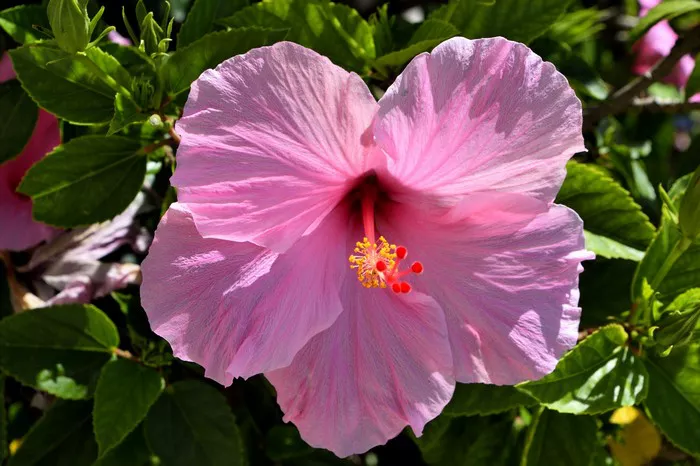Hibiscus plants, known for their vibrant and showy flowers, adorn gardens and landscapes around the world. However, pet owners often wonder whether these beautiful plants pose a threat to their furry companions. In this article, we delve into the potential toxicity of hibiscus plants to dogs, exploring the risks, symptoms of poisoning, and steps for prevention and treatment.
Understanding Hibiscus Plants
Hibiscus plants belong to the Malvaceae family and encompass hundreds of species, including both perennial and annual varieties. These plants are prized for their large, colorful flowers that come in an array of hues, including shades of red, pink, orange, yellow, and white. Common species include Hibiscus rosa-sinensis, Hibiscus syriacus (rose of Sharon), and Hibiscus sabdariffa (roselle).
Hibiscus plants are popular choices for gardens, landscaping, and indoor decoration due to their aesthetic appeal and relatively low maintenance requirements. However, despite their beauty, certain parts of the hibiscus plant contain compounds that may be harmful to dogs if ingested.
Potential Toxicity to Dogs
While hibiscus plants are not generally considered highly toxic to dogs, they do contain substances that can cause mild to moderate gastrointestinal upset if consumed in sufficient quantities. The primary toxic compounds found in hibiscus plants include anthocyanins, saponins, and organic acids.
Anthocyanins are pigments responsible for the vibrant colors of hibiscus flowers. While they are not typically harmful in small amounts, ingesting large quantities may lead to digestive issues such as vomiting and diarrhea in dogs.
Saponins are glycosides found in various plant species, including hibiscus. Ingestion of saponins can irritate the gastrointestinal tract, leading to symptoms such as nausea, vomiting, and diarrhea.
Organic acids, such as citric acid and malic acid, are naturally occurring compounds in hibiscus plants. While these acids are generally safe for humans and dogs in small quantities, excessive consumption may result in stomach upset and discomfort.
Symptoms of Hibiscus Poisoning in Dogs
If a dog ingests parts of a hibiscus plant, they may exhibit various symptoms of poisoning. These symptoms can vary depending on the amount ingested and the individual dog’s sensitivity. Common signs of hibiscus poisoning in dogs may include:
Vomiting
Diarrhea
Nausea
Drooling
Lack of appetite
Abdominal discomfort or pain
Lethargy
Dehydration
In severe cases or if large quantities of the plant are consumed, more serious symptoms such as difficulty breathing, tremors, and seizures may occur. It’s essential to monitor dogs closely if they have access to hibiscus plants and seek veterinary care if any concerning symptoms develop.
Prevention and Treatment
Preventing hibiscus poisoning in dogs involves taking proactive measures to limit their access to these plants and educating pet owners about the potential risks. Here are some steps for prevention:
1. Plant Placement: If you have hibiscus plants in your garden or home, consider their placement carefully to prevent dogs from accessing them. Keep plants out of reach or use barriers to restrict access.
2. Supervision: When spending time outdoors with your dog, supervise them closely to ensure they do not nibble on potentially toxic plants, including hibiscus.
3. Training: Train your dog to avoid consuming plants and other items from the garden. Positive reinforcement techniques can help reinforce desired behaviors.
4. Substitute Plants: If you’re concerned about the safety of hibiscus plants around your dog, consider replacing them with pet-friendly alternatives that pose minimal risk of toxicity.
5. Emergency Preparedness: In case of accidental ingestion, familiarize yourself with the signs of hibiscus poisoning and know the location and contact information for emergency veterinary services.
If you suspect your dog has ingested parts of a hibiscus plant or is displaying symptoms of poisoning, contact your veterinarian immediately. Treatment may involve inducing vomiting, administering activated charcoal to absorb toxins, providing supportive care to manage symptoms, and ensuring adequate hydration.
Conclusion
While hibiscus plants add beauty and color to gardens and indoor spaces, pet owners should be aware of the potential risks they pose to dogs. While not highly toxic, certain parts of hibiscus plants contain compounds that can cause gastrointestinal upset and other symptoms if ingested. By taking preventive measures to limit access and educate themselves about the signs of poisoning, pet owners can help keep their canine companions safe. In case of accidental ingestion, prompt veterinary attention is essential for timely diagnosis and treatment. With proper care and awareness, dogs and hibiscus plants can coexist harmoniously in shared environments.


